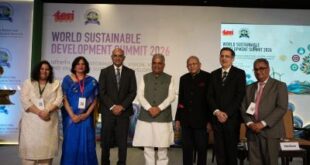-
Founded by former ISRO experts Christopher Parmar and Anupam Kumar, Orbitt Space is building next-gen satellite bus platforms to unlock the potential of Ultra-Low Earth Orbit (ULEO)
-
Funding to accelerate product design and development, engineering team expansion, and prototype testing for ULEO missions
Ahmedabad, India, 28th May 2005: Orbitt Space, an Ahmedabad-based space-tech startup founded by ex-ISRO Scientist/Engineer, has raised $1 million in a pre-seed funding round led by pi Ventures, with participation from IIMA Ventures.
Founded in early 2025 by Christopher Parmar and Anupam Kumar, who bring ISRO-honed expertise in designing and developing high-reliability satellite systems, Orbitt Space is building a breakthrough Air-breathing Electric propulsion system and next-gen satellite bus platform designed for Ultra Low Earth Orbit (ULEO) below 250 km altitude – a zone that remains untapped due to high atmospheric drag and fuel constraints.
The capital raised in this round will be deployed to accelerate the design and development of Orbitt’s proprietary electric propulsion technology and avionics systems, to build a world-class core team of scientists and engineers, and to begin rigorous testing of its first prototype with the aim to validate the technology. These efforts are a critical step toward realising the company’s vision of enabling sustainable, debris-free, long-duration, satellite operations in ULEO.
Currently, satellites primarily operate in Low Earth Orbit (LEO), which is rapidly becoming congested and hence hazardous, with over 40,000 tracked objects and an estimated 1.2 million smaller debris fragments that can trigger collisions. With the natural deorbiting of satellites post-mission, ULEO presents a self-regulating solution to space debris. It also delivers key performance advantages such as significantly sharper imaging, reduced signal latency and radiation protection that allows the use of cost-effective commercial electronics thereby reducing upfront capex.
To tap into the potential of the unexplored ULEO, Orbitt is developing a proprietary technology that enables satellites to operate sustainably for 5–7 years, even in high-drag environments. Their electric propulsion system uses residual atmospheric gases as propellant, eliminating the need for onboard fuel. Paired with a high-agility, 200kg-class satellite bus, Orbitt will deliver a powerful solution for earth observation, low latency telecommunications, climate monitoring, surveillance, and scientific missions.
While the potential of this technology is widely recognized, it is still in the R&D stages globally and has not yet been commercialized at scale. Orbitt aims to be one of the first companies to launch a ULEO satellite powered by their propulsion technology.
Christopher Parmar, Co-founder & CEO of Orbitt Space, said “ULEO is the cleanest and most strategic orbit around Earth, yet it has remained inaccessible until now. Our electric propulsion system will change that, enabling satellites to operate longer missions at low altitudes while delivering advanced imaging and data capabilities without contributing to orbital pollution. With this funding, we take our first step towards making sustainable, fuel-free satellite operations a reality.”
Anupam Kumar, Co-founder & CTO of Orbitt Space, added “For us, this isn’t just about building electric propulsion and satellite platform technologies, it’s about reshaping how we access space. Having spent initial years at ISRO in satellite environment testing, I have seen firsthand the challenges of satellite longevity in orbit. With Orbitt, we aim to build platforms that redefine global standards for performance, cost-efficiency, and sustainability.”
“India’s deep-rooted excellence in spacetech, led by ISRO, is now fuelling a new wave of private innovation. Orbitt Space is poised to disrupt the satellite market by pioneering access to ULEO to deliver better performance and lower costs for satellite operators. Founders Christopher and Anupam, with a decade of hands-on experience at ISRO building, testing and deploying mission-critical systems, are reimagining in-space propulsion by replacing traditional fuel with atmospheric gases. We’re thrilled to back this bold vision for a cleaner, more efficient future in spacetech,” said Shubham Sandeep, MD at pi Ventures, lead investor.
Orbitt Space is currently in the development phase focused on building and qualifying its core propulsion and avionics systems. The next phase will involve in-orbit demonstrations to validate performance, followed by the commercial rollout of Orbitt’s ULEO satellite platform. The company aims to spearhead India’s entry into this emerging orbital frontier, by defining a new category of efficient, sustainable space infrastructure and enabling a new era of persistent, high-resolution earth observation and higher data rates, to strengthen the country’s strategic capabilities.
 Newspatrolling.com News cum Content Syndication Portal Online
Newspatrolling.com News cum Content Syndication Portal Online






